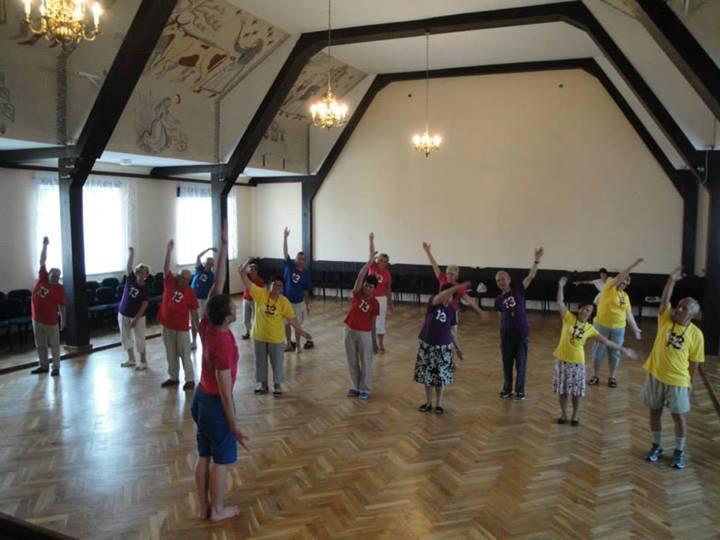
Photo: Mirek Kaczmarek.
On Thursday and Friday, 5 & 6 September (6 pm)Mikołaj Mikołajczykwill present his newest collaboration withWrzos choir from Zakrzewo, a villagein Poland’s region of Wielkopolska, entitledProjekt. Noce i dnie[Nights and Days Project]. The production came to life as part of the programmeWielkopolska: Rewolucje[Wielkopolska: Revolutions], implemented by the region’s local authorities and curated by Agata Siwiak.
The production comes after last year’s acclaimed Teraz jest czas[Now Is The Time], which was presented at the Museum of Modern Art in Warsaw and the Malta Festival in Poznań, among others. Both are part of the programme Wielkopolska: Rewolucje[Wielkopolska: Revolutions].
This year Mikołajczyk and his select team, including Małgorzata Dziewulska(dramaturgy collaboration), Mirkiem Kaczmarkiem(set and video designer) and Zbigniew Kozub (composer), decided to take a step further challenging older-age Wrzos singers not only to get involved in movement theatre, but also to reflect on their own life story. In the process they will be drawing inspiration from Maria Dabrowska’s Noce i dnie [Nights and Days], a 1930’s novel rooted deeply in Wielkopolska’s history and exploring questions about fulfilled or unfulfilled life.
The production will feature fifteen older-age singers and the choreographer Mikołaj Mikolajczyk, supported by noted artists: dancer Iwona Pasińskaand actor Adam Ferency.This unusual theatrical genre which might be dubbed “participatory theater” will produce a common language between them. “Perhaps it’s worth to lose yourself in life and live a few mere weeks in such a manner as to remember them for your whole life to come.”
In association with:“Dom Polski” Culture Centre in Zakrzewo, Art Stations Foundation / Stary Browar Nowy Taniec
Presentations in Zakrzewo:5 & 6 September at 6 pm
Presentations at Stary Browar in Poznań:8 & 9 December
ØWielkopolska: Rewolucje
We associate revolutions with the city, metropolis, the centre of the world. Their impact is powerful. This project is devoted to micro-revolutions which, just as micro-histories, are not on everybody’s tongues, elaborated on in textbooks and discussed by the world’s media. Yet they are creative, frenzied, subversive. These are going to be ethical revolutions that do not eat their own children but provoke social involvement and living a passionate life.
(Agata Siwiak, curator of Wielkopolska: Rewolucje)
Set up by the local authorities of the region of Wielkopolska in 2012, the programmeWielkopolska: Rewolucje [Wielkopolska: Revolutions] was born out of defiance to a centralised understanding of culture. It aims to integrate local communities, stimulate them artistically, bring generations closer together, define identity through residence, and to do away with the stereotype that in the periphery there are no potential recipients (and co-authors) of avant-garde, critical art. Currently, new editions of Rewolucje are being prepared to be presented in the course of the next two years as part of Budzik kulturalny. Program działań promujących i aktywizujących kulturę Wielkopolski, a programme of cultural promotion of the local authorities of Wielkopolska supported by the European Regional Development Fund as part of the Wielkopolska Regional Operational Programme 2007-2013. Budzik is coordinated by the provincial culture department in Poznań.
To-date six projects have been realised for Rewolucje across the region’s villages and little towns, their authors being: Joanna Warsza, Mikołaj Mikołajczyk, Janusz Orlik, Magda Hasiak, Antoni Beksiak, Bartek Frąckowiak and Monika Jakubiak, all representing different media – performing arts, film, music, fashion or design. The “revolutionary” outcomes of 2012 were presented at this year’s Generator Malta, Malta Festival Poznań.
About the curator of Wielkopolska: Rewolucje:
Agata Siwiak was born in 1974. Having graduated in culture studies, she works as curator, and producer of theatrical and interdisciplinary projects. She is “one of these curators that treat festivals as works of conceptual, discursive art. Her projects always focus on a given problem or issue that is later tackled by the invited artists,” claims the website of the European Culture Congress in Wrocław, for which she curated Trickster 2011, a performance art programme. The congress was the key cultural event of the Polish EU presidency in 2011. Since 2012 Siwiak has been curating Wielkopolska: Rewolucje, a social and artistic programme of the local authorities of Wielkopolska. In 2008-2009 she was artistic co-director of the Four Cultures Dialogue Festival in Łódź (together with Grzegorz Niziołek), and deputy director of Miasto Dialogu, a municipal cultural institution in Łódź. Before that, in 2004-07 she worked with Stary Teatr in Krakow, where she led the festival baz@rt, organised local events and coordinated international projects. In 2002-04 she worked with Teatr Polski in Wrocław, where she organised EuroDrama festival together with
Paweł Miśkiewicz. She was member of the programme board of the International Network for Contemporary Performing Arts (IETM ) meeting in Kraków (2011) and of a team of experts set up by the Minister of Culture and National Heritage of Poland (2011). She leads a theatre curating programme at the Adam Mickiewicz University in Poznań.